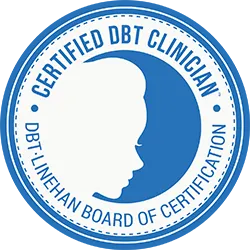Couples Counseling in Denver with DBT-Based Therapy
Relationships can be hard, especially when emotions run high or communication breaks down. Maybe you’re stuck in the same argument again and again, or your connection feels more strained than supportive. These patterns don’t just wear you out; they wear down your relationship.
That’s where our Couples DBT Program comes in. At Front Range Treatment Center, we use Dialectical Behavior Therapy (DBT) to help couples navigate emotional intensity, improve communication, and repair trust.
If you’re looking for couples counseling in Denver that’s structured, collaborative, and backed by evidence, you’re in the right place.
What Is Couples DBT?
Couples DBT is different from traditional couples therapy. Instead of just talking through issues, you’ll learn how to analyze ineffective behaviors and replace them with skills that actually work. DBT helps you stay calm, listen better, and respond in ways that bring you closer, not further apart.
At FRTC, you’ll learn valuable relationship skills in your therapy sessions. You and your partner will work directly with a DBT-trained clinician who guides the process with empathy, structure, and clarity. Together, you’ll learn how to manage conflict, regulate intense emotions, and rebuild trust, step by step.

Our Couples DBT Program: How It Works
Phase I: Assessment
We begin with a deep dive into your relationship. This includes joint sessions, a detailed intake, and a computerized assessment that highlights your specific strengths and struggles. This isn’t just paperwork: it gives us a clear starting point.
Your therapist will create a customized plan that outlines your shared goals and treatment focus. You’ll have input on everything we target together.
Phase II: Weekly Sessions
You’ll attend weekly therapy sessions with your partner. Sessions combine communication work with practical DBT skills. We’ll focus first on creating safety and understanding. Then we shift into reducing conflict and deepening connection.
If one or both of you are also working on individual mental health challenges, we may recommend individual DBT support as a supplement.
Phase III: Maintenance and Skill Support
Once you’ve built a solid foundation, you’ll move into biweekly or monthly sessions for continued support. These “tune-ups” help you stay grounded, practice your new skills, and keep the progress going.



Phase I: Assessment
We begin with a deep dive into your relationship. This includes joint sessions, a detailed intake, and a computerized assessment that highlights your specific strengths and struggles. This isn’t just paperwork – it gives us a clear starting point.
Your therapist will create a customized plan that outlines your shared goals and treatment focus. You’ll have input on everything we target together.

Phase II: Weekly Sessions
You’ll attend weekly therapy sessions with your partner. Sessions combine communication work with practical DBT skills. We’ll focus first on creating safety and understanding. Then we shift into reducing conflict and deepening connection.
If one or both of you are also working on individual mental health challenges, we may recommend individual DBT support as a supplement.

Phase III: Maintenance and Skill Support
Once you’ve built a solid foundation, you’ll move into biweekly or monthly sessions for continued support. These “tune-ups” help you stay grounded, practice your new skills, and keep the progress going.

Why Choose DBT for Couples Counseling?
DBT isn’t just for individuals. It’s a powerful way for couples to strengthen emotional awareness and learn healthier ways to respond.
This approach is especially helpful when:
Emotions escalate quickly during arguments
One or both partners struggles with regulation
Conflict feels unmanageable or stuck
You feel distant, resentful, or misunderstood
Couples DBT focuses on skills like mindfulness, emotion regulation, validation, and boundary setting. These concrete, evidence-based tools can help shift how you relate, repair, and reconnect.
When Is It Time for Couples Therapy?
The sooner, the better. Most couples wait too long before reaching out. If your relationship has been feeling tense, unbalanced, or emotionally distant for a while, therapy can help shift things before they fracture.
Some common signs it’s time to consider couples therapy:
- Recurring arguments that never feel resolved
- Communication that feels hostile, tense, or shut down
- One or both partners feeling emotionally overwhelmed or disconnected
- Ongoing stress or trauma related to infidelity, grief, or major life transitions
- Feeling more like roommates than romantic partners, even though you love each other
What If We’ve Tried Couples Counseling Before?
If you’ve tried couples counseling before, you may wonder if it’s worth trying again. Many couples come to us after trying therapy that felt aimless, unbalanced, or unproductive. What makes Couples DBT different is structure. Each session has a focus, and each skill has a purpose. Your therapist has a clear roadmap for what to do next.
This isn’t about endless processing without progress. It’s about making real change in how you communicate, manage emotion, and support each other.
If past therapy didn’t go anywhere, this could be the reset you need.
What If One Partner Is Struggling More Than the Other?
Relationships don’t happen in a vacuum. If one or both partners is dealing with their own mental health concerns, that matters. Our program allows space for both shared and individual support.
In some cases, we’ll recommend that one or both partners join our Adult DBT program. This offers more in-depth skills work on regulating emotions, handling triggers, or managing anxiety and depression.
Couples DBT is designed to adapt to your unique needs both as a pair and as individuals. We’ll work together to find the best path forward.

Why Choose Front Range Treatment Center for Couples Counseling?
We’re a DBT-Linehan Board of Certification, Certified Program™. This rare designation means we meet the highest standards for delivering DBT therapy.
Our couples therapists are trained and supervised in DBT and use this approach intentionally in their work with couples. They know how to guide partners through conflict, emotional dysregulation, and relationship breakdowns with both skill and compassion.
You receive structured, research-supported couples therapy from clinicians who specialize in helping couples navigate intense emotional challenges and build more effective ways of relating.

Ready to Start Couples Counseling in Denver?
If your relationship needs support, we’re here to help. Whether you’re facing a crisis or just want to communicate better, our Couples DBT program is designed to help you reconnect, repair, and move forward.Call (720) 390-6932 or schedule your free phone consultation online.
FAQs
What is Couples DBT, and how is it different from traditional couples therapy?
Couples DBT (Dialectical Behavior Therapy) is a structured, skills-based approach that goes beyond conversation. While traditional couples therapy might explore past patterns and communication styles, DBT focuses on teaching specific, evidence-based tools for emotional regulation, mindfulness, and conflict resolution. In Couples DBT, each partner learns how to manage intense emotions, communicate more effectively, and respond to stress without escalating conflict. Sessions are goal-oriented and practical, helping you break out of unhealthy cycles and replace them with new, more supportive habits. It’s especially helpful when traditional talk therapy hasn’t created lasting change or feels too passive.
Who is a good fit for Couples DBT at FRTC?
Couples DBT is ideal for relationships marked by recurring conflict, emotional overwhelm, or communication breakdowns. It’s a particularly good fit when one or both partners struggles with mood swings, anxiety, or difficulties managing strong emotions. That said, you don’t need to be in crisis to benefit. Many couples join the program simply to strengthen their connection and develop healthier ways of relating. If you’re committed to working on your relationship and open to learning practical tools, you’re likely a strong candidate. FRTC’s program meets you where you are, whether you’re rebuilding or reconnecting.
How long does the Couples DBT program take?
The timeline for Couples DBT varies depending on your relationship goals and the challenges you’re facing, but most couples begin with weekly sessions over a span of three to six months. During that time, you’ll work through a tailored plan that focuses on developing emotional regulation, communication skills, and trust. As progress is made, sessions may shift to biweekly or monthly check-ins to help maintain momentum. There’s no one-size-fits-all timeline. Your therapist will help you set expectations and adjust the structure as needed. The focus is on long-term change, not quick fixes or endless open-ended sessions.
What if we’ve already tried couples therapy that didn’t work?
If you tried couples therapy in the past that didn’t work, you’re not alone. Many couples come to FRTC after previous therapy felt too unstructured, one-sided, or ineffective. Couples DBT offers a different approach. Each session is guided by a clear plan and a focus on skill-building. Rather than rehashing the same arguments, you’ll learn new ways to manage them and respond with intention. Our therapists are intensively trained and trained to navigate complex dynamics with care and direction. If your last therapy experience lacked progress or clarity, this program might be the structure and support you’ve been missing. We’re focused on real change, not just surface-level conversations.
Do both partners need to participate equally for Couples DBT to be effective?
While it’s helpful when both partners are equally engaged, it’s also normal for one person to feel more hesitant at first. What matters most is a shared willingness to show up and try. Our therapists are skilled at navigating imbalances in motivation or participation, and part of the process includes identifying how each person contributes to patterns in the relationship. That said, real change does require effort from both sides. If one partner consistently resists the process, individual therapy might be recommended as a complement. Couples DBT works best when it’s a team effort, even if it starts unevenly.
Can we do Couples DBT alongside individual therapy?
Yes, and in many cases, it’s encouraged. If one or both of you are dealing with personal mental health challenges, such as anxiety, depression, trauma, or emotional dysregulation, individual therapy can support the work you’re doing together. At FRTC, we often integrate Couples DBT with our Adult DBT program to address both shared and individual needs. This dual-track approach allows each partner to build emotional resilience on their own, while also working on the relationship as a unit. Your couples therapist will help determine if individual sessions would benefit your process and coordinate care to ensure consistency and progress.
